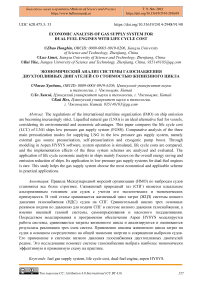Economic analysis of gas supply system for dual fuel engines with life cycle cost
Автор: Zhao Hongbin, Luo Limei, Bai Yike
Журнал: Бюллетень науки и практики @bulletennauki
Рубрика: Технические науки
Статья в выпуске: 6 т.9, 2023 года.
Бесплатный доступ
The regulations of the international maritime organization (IMO) on ship emission are becoming increasingly strict. Liquefied natural gas (LNG) is an ideal alternative fuel for vessels, considering its environmental and economic advantages. This paper compares the life cycle cost (LCC) of LNG ships low pressure gas supply system (FGSS). Comparative analysis of the three main pressurization modes for supplying LNG in the low-pressure gas supply system, namely external gas source pressurization, self-pressurization and cryogenic pump boost. Through modeling in Aspen HYSYS software, system operation is simulated, life cycle costs are compared, and the implementation effects of the three system schemes are analyzed and evaluated. The application of life cycle economic analysis in ships mainly focuses on the overall energy saving and emission reduction of ships. Its application in low pressure gas supply systems for dual-fuel engines is rare. This study helps the gas supply system choose the most economical and applicable scheme in practical applications.
Fuel gas supply system, life cycle cost, dual-fuel engine, aspen hysys
Короткий адрес: https://sciup.org/14127994
IDR: 14127994 | УДК: 628.475.3: | DOI: 10.33619/2414-2948/91/40
Текст научной статьи Economic analysis of gas supply system for dual fuel engines with life cycle cost
Бюллетень науки и практики / Bulletin of Science and Practice
UDC 628.475.3: 33
Global emissions regulations are tightening to mitigate the environmental impact of marine transport. In 2020, the International Maritime Organization (IMO) implemented new "Low Sulfur Fuel" regulations (LSF2020) that cap fuel sulfur content at 0.5% globally and 0.1% in emission control areas (ECAs) [1]. Given these increasingly stringent standards, ships can no longer consume conventional heavy fuel oil (HFO) in ECAs, which produces substantial air pollutants such as SOx, NOx, particulate matter, and CO 2 [2].
LNG (Liquefied Natural Gas), as a new type of green and environmentally friendly energy, produces virtually zero sulfur dioxide emissions and can reduce other pollutants by up to 90% versus HFO [3]. Given its significant environmental and economic advantages, more ship owners and operators are adopting LNG propulsion.
LNG derives from atmospheric natural gas that undergoes deep cryogenic cooling process and filtering out all impurities at -162T. The resulting liquid must vaporize into gaseous natural gas (NG) and achieve appropriate pressure before entering the engine for combustion [4]. Dual-fuel engines can utilize gaseous or liquid fuels, offering additional advantages in lower rotation speed, higher power, stable operation, and lower maintenance costs.
Marine dual-fuel engine gas supply systems have developed substantially over time, going through multiple technology upgrades. The system forms have become rather mature now. Among the current technologies, companies typically build them using their own technologies or outsource to specialized service companies for construction, and conduct integrated analysis and evaluation of system performance. The life cycle during application can be divided into LCA (life cycle assessment) and LCC (life cycle cost). LCA and LCC have been shown to help assess the overall economic and environmental impact of a particular product or system.
Many different industries have applied life cycle theory for evaluation. Similarly, life cycle theory has also been applied to shipbuilding to analyze the total costs and environmental impacts of ship design schemes. E. Blanco-Davis [5] performed an economic and environmental analysis of two different hull coating methods and three different types of ballast water treatment systems to assess and compare the environmental load generated. H. Wang [6] conducted a case study based on the life cycle assessment approach to determine the best hull maintenance approach for short-haul ferries taking into account long-term environmental impacts and costs, with the primary aim of promoting cleaner and more economical shipping; Taking the steel hull of a ship as an example, P. Gilbert [7] applied life cycle assessment methods to determine the effectiveness of material utilization in reducing carbon dioxide emissions. S. Zuin [8] and others through the application of life cycle assessment to explore family port ship waste management potential impact on the environment, because the life cycle assessment can determine a single operation, such as waste transportation, landfill, etc.) of the surveyed system overall environment load ratio. For that the evaluation results can be used as the basis of ship waste management planning to support decision making; G. E. Bijwaard [9] took insight into the effectiveness of timing inspection in extending the life of a ship by creating a ship life cycle. M. Perčić [10] analyzed several alternative marine fuels for the purpose of identifying alternative marine fuels suitable for Croatia's short sea shipping sector. Finally the most environmentally friendly fuels were determined based on a life cycle assessment, along with a life cycle cost assessment to determine the most economically viable solution. S. Seo et al [11] applied life cycle cost to evaluate the operation costs of three gas supply system configurations and pointed out that the most important factors for economic evaluation are BOG release and availability of mechanical devices. C. Wang [8] and others compared and analyzed three BOG management schemes under different conditions based on life cycle cost, the research results show that there is no general solution to apply to all, and the selection of appropriate the configuration of low-pressure gas supply system largely depends on the size of the ship, the price of liquefied natural gas (LNG) fuel and the operation of the ship.
The application of life cycle assessment in ships mostly focuses on the overall energy saving and emission reduction of ships; LCC focuses on analyzing economic benefits. However, in the low-pressure gas supply system of dual-fuel engine, because of different pressurization methods of LNG cryogenic liquid storage tank, the system cost and performance differ, but no one has studied the system cost yet. In this paper, from the point of view of the whole life cycle, three kinds of pressure increasing and regulating modes of gas supply system are taken as the research object, and three kinds of mainstream pressure increasing and regulating modes of gas supply system models are established. The life cycle cost of gas supply system is divided, the influence of its performance status on the economic performance of the system is analyzed, and the economic performance analysis method of gas supply system based on life cycle is evaluated.
Material and research methods
LCA (Life Cycle Assessment) is the use of theory and method of the whole life cycle to assess the environmental impact of products or processes throughout their life cycle, and to make recommendations for optimization accordingly. This approach mainly focuses on the environmental impact of products or processes in terms of ecological environment and energy consumption Ошибка! Источник ссылки не найден. . LCC (life cycle cost) is used to analyse the sum of all costs incurred by a product or process throughout its life cycle.
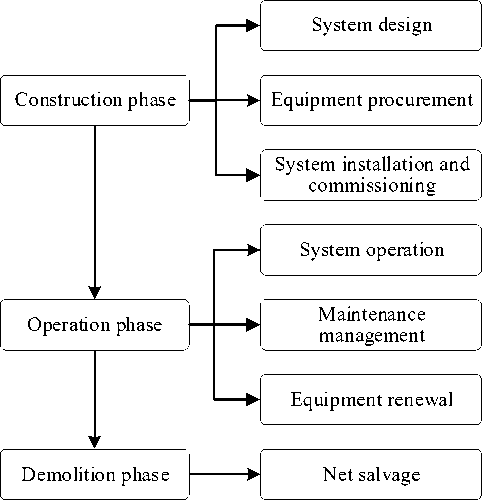
Figure 1. The stage division of LCC
This approach is mainly to study how to control and optimize the cost from a life cycle perspective in order to achieve optimal efficiency. This approach to life cycle costing is now widely used in various fields due to its cost perspective. Due to the greater environmental benefits and significant emissions reduction of dual-fuel engines, this study did not adopt LCA but used LCC to study and analyse economic benefits. According to life cycle theory, the division of life cycle cost is shown in Figure 1.
The cost of decision-making stage and design is the pre-decision cost and the necessary prerequisite to complete the system. For the gas supply systems, in addition to completing the initial work, equipment procurement, construction, installation are also required, which are taken together as the initial investment costs. Many equipment in the gas supply system need to be provided by the outside world and consume electric energy. This part is the operation cost, while the equipment maintenance and manpower consumption in the formal operation of the system are the maintenance and management costs. At the end of the service life of the system, the equipment will be recycled, which represents the residual value.
According to the whole life cycle characteristics of fuel gas supply systems and the abovementioned stage division theory; this study divides the life cycle of fuel gas supply system into three stages: construction phase, operation phase and demolition phase. The construction phase includes system design, equipment procurement, system installation and debugging; the operation phase includes system operation, maintenance management and equipment renewal; the dismantling phase is the corresponding net residual value, namely the residual value recovered from the equipment. The following formula can be used in the calculation of the LCC.
” 1 + r
LCC = IC + ^ OC(1 + i ) - t + ^ MC. I I - S t = 1 t '= 1 v 1 + i ^
In the formula, IC is the initial investment cost of the system; t is the number of years of system operation; t' is the number of maintenance of the equipment in the system; I is the discount rate, which is taken as 8% in this study; R is the inflation rate, which is taken as 2.8% in this study; S is the residual value of the system; OC i is the operating cost of the system in year t; MC i is the maintenance cost of the equipment in the system in year t.
The 15,000 DWT chemical tanker studied in this paper has a total length of 177 m, a beam of 22 m, a load of 15,000 t, a service speed of 14.5 knots and an endurance of 6,600 nautical miles. The ship is equipped with WinGD 5RT-flex50DF type dual-fuel engines. At 100% load, the rated power is 850 kg/h, the inlet temperature and pressure remain consistent, and it can stably operate in gas mode during ship navigation. The processing of NOx in fuel oil mode also fully meets the emission requirements of the International Maritime Organization. The two working modes can be switched without restrictions, meeting the trend of green and low-energy consumption development of the global shipping industry. The service life of the system is 20 years and the maintenance cycle is 5 years.
In the low pressure gas supply system of dual fuel ships, there are certain pressure losses in all pipelines and equipment of the entire system. And the pressure of natural gas after vaporization (abbreviated as NG) needs to meet the conditions of LNG low pressure gas supply. External gas source boosting, self-boosting and pump boosting are the most common compression methods for low pressure gas supply of dual fuel ships. The three pressure boosting schemes are shown in Figure 2-4.
The external gas source boosting method uses an external gas source to achieve boosting, requiring additional cylinders and high-pressure natural gas; self-boosting is currently the most common boosting method for LNG low-temperature storage tanks, which uses a small amount of LNG flowing out of the storage tank to vaporize by absorbing heat outside the storage tank and then transporting it to the storage tank to increase the tank pressure; Low temperature pump boosting installs a boost pump at the outlet of the LNG storage tank to transport the LNG with a steady mass flow rate to the vaporizer.
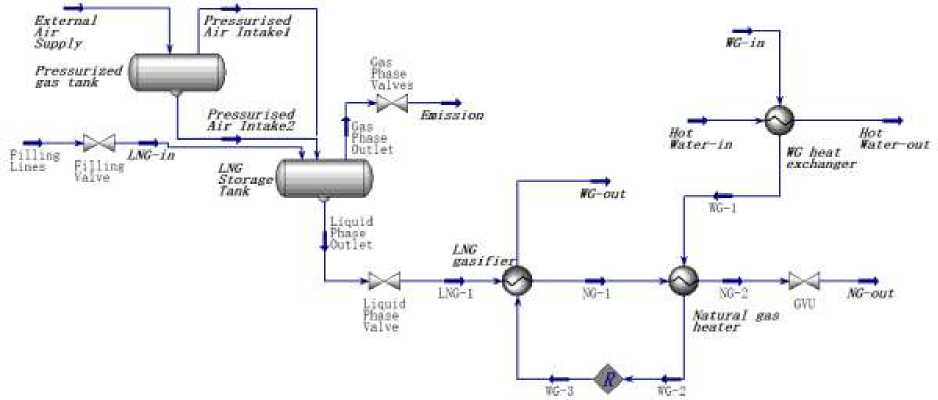
Figure 2. Fuel gas supply system with external gas source pressurization
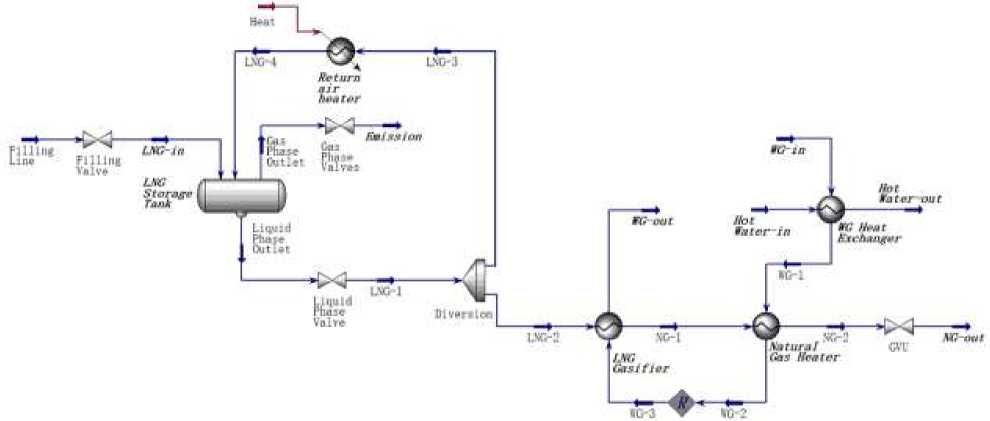
Figure 3. Fuel gas supply system with self-pressurization
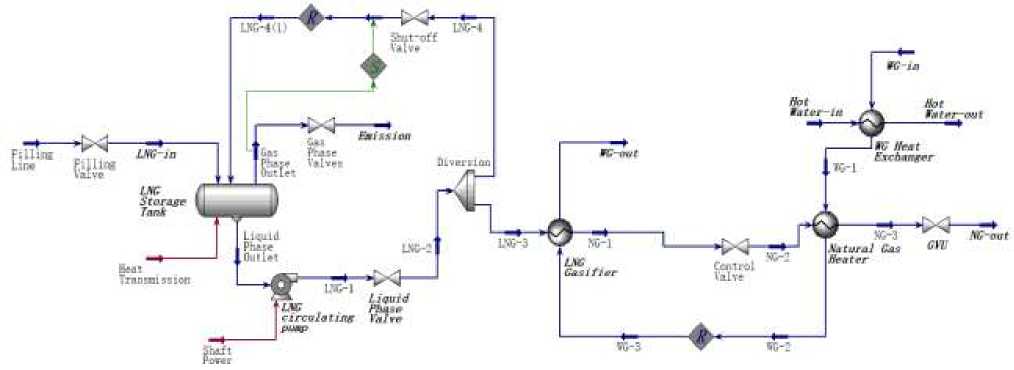
Figure 4. Fuel gas supply system with cryogenic pump boost
This paper builds models of the three pressure boosting systems of LNG supply in Aspen HYSYS software, simulates system operation, compares LCC costs, analyzes the implementation effects of three system schemes and gives evaluations. Different devices in the three system schemes are high-pressure gas tank, boost vaporizer and boost pump.
Results and discussion
The molar fraction of LNG is 94% methane, 4.7% ethane, 0.8% propane, 0.2% butane and 0.3% nitrogen. For convenience of calculation and analysis, this paper takes the price of LNG as 4.5 RMB /kg, the price of ethylene glycol solution (50% concentration) as 0.5 RMB /kg, and the prices of equipment and accessories are taken from the database built in Aspen HYSYS software. It is assumed that the low pressure gas supply system serving the dual-fuel engines in this paper has a service life of 20 years. According to the ship inspection and maintenance regulations, the system needs to be maintained 4 times during its lifetime. Based on the basic parameters of a 15,000 T chemical tanker designed, the endurance of the dual-fuel engines is 19 days. So during its lifetime, the gas supply system can operate a maximum of 384 times. At the dismantling stage, the net salvage value of the equipment is 4% of the equipment cost. The calculation results of LCC of three options are shown in Table.
Table
THE CALCULATION RESULTS OF LCC OF THREE OPTIONS
|
Project name |
Option 1 |
Option 2 |
Option 3 |
|
|
Construction phase |
Equipment cost ( RMB ) |
408200 |
423700 |
291900 |
|
Installation cost ( RMB ) |
3159700 |
3059600 |
2329600 |
|
|
Other costs ( RMB ) |
13800 |
12100 |
5600 |
|
|
Operation phase |
Material cost ( RMB ) |
941005000 |
843564000 |
716677000 |
|
Energy consumption cost ( RMB ) |
1520000 |
1550600 |
1520000 |
|
|
Maintenance management ( RMB ) |
241200 |
236100 |
231100 |
|
|
Demolition phase |
Net salvage value ( RMB ) |
16300 |
18100 |
11700 |
|
Total life-cycle cost ( RMB ) |
946364200 |
848864200 |
721066900 |
|
As can be seen from Table 1, the total life-cycle cost of the three options is the highest for the external gas source pressurization scheme and the lowest for the self-pressurization option. Since the external gas source pressurization option requires an additional of a high-pressure gas tank, some additional costs are incurred in the maintenance and management of the tank and in the storage of gas. For the cryogenic pump boost option, the industry is set up in the bank submersible pump and a booster pump outside the tank, and the external tank is used in this paper, which has a relatively low maintenance cost. The self-pressurization option is the lowest in all stages of life cycle cost. The cost distribution of each option is shown in Figure 5.
Conclusions
In this study, life cycle evaluation is applied to three kinds of pressure increasing and regulating modes of gas supply system. The gas supply system models of three mainstream pressure increasing and regulating modes are established, and the influence of the system is analyzed. The following conclusions can be drawn:
-
(1) From the perspective of system security, the external gas source pressurization scheme has the highest maintenance cost and higher safety requirements for high-pressure gas tank, so it is necessary to configure the higher requirements of safety monitoring function, and a good job of operation training for operators.
■ Equipment cost (RMB) ■ Installation cost (RMB)
■ Other costs (RMB) ■ Material cost (RMB)
■ Energy consumption cost (RMB) ■ Maintenance management (RMB)
■ Net salvage value (RMB)
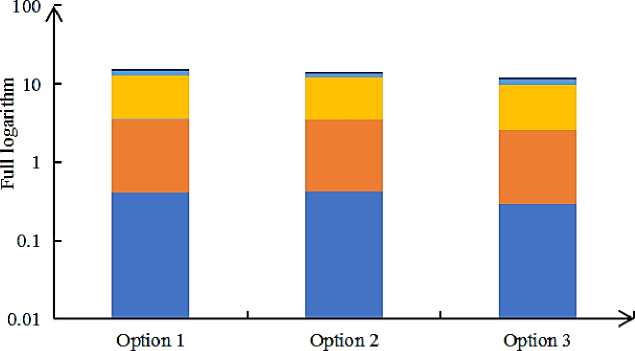
Figure 5. Cost distribution at each stage
-
(2) From the perspective of system reliability, the low temperature pump pressurization scheme adopts external power head to ensure the stability of LNG supply, and adopts one main and one standby for safe use. However, it requires additional purchase of cryogenic pump, which is expensive, will increase power consumption, poor economy, and high difficulty in installation and maintenance. Therefore, it is more suitable for the storage tank of the LNG fuel vessel.
-
(3) From the system operation point of view, the self-pressurization option is to start the gas return cycle at the same time as the system starts, so that the pressure in the LNG storage tank is stabilized near the working pressure, so as to ensure the system continues to work normally. It is a more economical way of pressurization, but requires the addition of a precise control system to make the whole gas supply unit run smoothly.
Список литературы Economic analysis of gas supply system for dual fuel engines with life cycle cost
- Ni, P., Wang, X., & Li, H. (2020). A review on regulations, current status, effects and reduction strategies of emissions for marine diesel engines. Fuel, 279, 118477. https://doi.org/10.1016/j.fuel.2020.118477
- Lloyd, H. (2016). Hapag Lloyd. Obtenido de Hapag LLoyd: https://www. hapaglloyd.com/content/dam/website/downloads/pdf/CARTA_DE_GARANTIA_p or_Embarque_2015. pdf.
- Register, L. (2012). LNG-fuelled deep sea shipping–The outlook for LNG bunker and LNG-fuelled newbuild demand up to 2025.
- Mousavi, S. M., Saray, R. K., Poorghasemi, K., & Maghbouli, A. (2016). A numerical investigation on combustion and emission characteristics of a dual fuel engine at part load condition. Fuel, 166, 309-319. https://doi.org/10.1016/j.fuel.2015.10.052
- Blanco-Davis, E., & Zhou, P. (2014). LCA as a tool to aid in the selection of retrofitting alternatives. Ocean engineering, 77, 33-41. https://doi.org/10.1016/j.oceaneng.2013.12.010
- Wang, H., Oguz, E., Jeong, B., & Zhou, P. (2018). Life cycle cost and environmental impact analysis of ship hull maintenance strategies for a short route hybrid ferry. Ocean engineering, 161, 20-28. https://doi.org/10.1016/j.oceaneng.2018.04.084
- Gilbert, P., Wilson, P., Walsh, C., & Hodgson, P. (2017). The role of material efficiency to reduce CO2 emissions during ship manufacture: A life cycle approach. Marine Policy, 75, 227-237. https://doi.org/10.1016/j.marpol.2016.04.003
- Zuin, S., Belac, E., & Marzi, B. (2009). Life cycle assessment of ship-generated waste management of Luka Koper. Waste management, 29(12), 3036-3046. https://doi.org/10.1016/j.wasman.2009.06.025
- Bijwaard, G. E., & Knapp, S. (2009). Analysis of ship life cycles—The impact of economic cycles and ship inspections. Marine Policy, 33(2), 350-369. https://doi.org/10.1016/j.marpol.2008.08.003
- Perčić, M., Vladimir, N., & Fan, A. (2020). Life-cycle cost assessment of alternative marine fuels to reduce the carbon footprint in short-sea shipping: A case study of Croatia. Applied Energy, 279, 115848. https://doi.org/10.1016/j.apenergy.2020.115848
- Seo, S., Chu, B., Noh, Y., Jang, W., Lee, S., Seo, Y., & Chang, D. (2016). An economic evaluation of operating expenditures for LNG fuel gas supply systems onboard ocean-going ships considering availability. Ships and Offshore Structures, 11(2), 213-223. https://doi.org/10.1080/17445302.2014.984389
- Wang, C., Ju, Y., & Fu, Y. (2021). Comparative life cycle cost analysis of low pressure fuel gas supply systems for LNG fueled ships. Energy, 218, 119541. https://doi.org/10.1016/j.energy.2020.119541
- Balcombe, P., Staffell, I., Kerdan, I. G., Speirs, J. F., Brandon, N. P., & Hawkes, A. D. (2021). How can LNG-fuelled ships meet decarbonisation targets? An environmental and economic analysis. Energy, 227, 120462. https://doi.org/10.1016/j.energy.2021.120462

